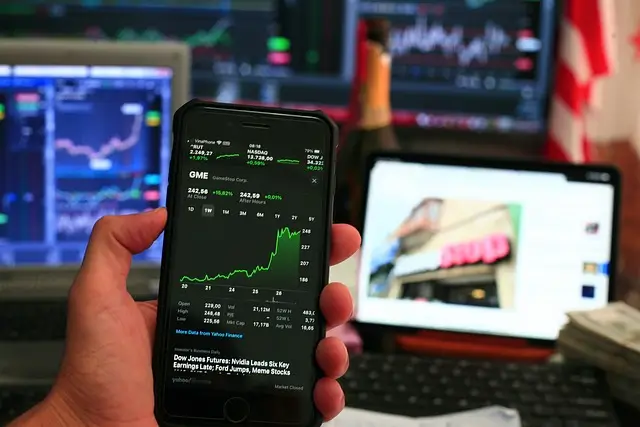Table of Contents
Meme stocks are a buzzword for investors, especially young retail investors familiar with technology. Bred on online forums and fueled by social media, meme stocks swing violently based on speculation instead of conventional market principles. For new investors, meme stocks represent a tantalizing prospect and a possible financial hazard that must be comprehended.
What Are Meme Stocks?
Meme stocks are literally stocks in firms that trend through online forums, and then see sudden increases in price. Their newfound popularity is seldom linked to the company’s bottom line but rather driven by viral online publicity.
Defining Meme Stocks
Meme stocks are unique in that they have the internet hype, especially on social media platforms like Reddit and Twitter, to thank for their popularity. Retail traders rally behind them, literally creating internet memes to show their enthusiasm. GameStop and AMC were the poster children of meme stocks, with their valuations skyrocketing during viral trading frenzies. Their characteristics? Price volatility to the extreme and momentum driven by social sentiment rather than financial value.
The Origin of Meme Stocks
The meme stock phenomenon can be traced back to January 2021 when GameStop’s stock was under a “short squeeze.” The hedge funds had shorted the video game retailer, but retail traders at the WallStreetBets subreddit of Reddit got together. They began purchasing stocks in bulk, which drove up the price and compelled short sellers to cover shorts at stratospheric losses.
This story was so captivating that it uprooted traditional Wall Street dynamics and even caught the attention of policymakers.
Popular Meme Stocks Today
While GameStop and AMC remain at the forefront, other meme stocks have risen to prominence in recent years. These include BlackBerry and Bed Bath & Beyond, which also achieved notoriety during the 2021 run-up. Today, the Solactive Roundhill Meme Stock Index continues to track leading meme stocks, informing investors of the activity of these high-profile stocks.
How Meme Stocks Work
The pricing of meme stocks defies traditional investing logic. Instead of balanced evaluations based on revenue or earnings, these stocks depend heavily on virality. But how does this work?
Read More: How to Find Meme Stocks
Role of Online Communities
Platforms like Reddit (specifically the WallStreetBets subreddit) serve as rallying points for retail traders. These communities analyze stock charts, share memes, and spread excitement about specific stocks. Social media amplifies the trend, where hashtags and trending topics draw even more people to join the movement. However, it’s a double-edged sword; the same hype that drives prices up also creates the potential for dramatic crashes.
Understanding Short Squeezes
Many meme stocks like GameStop have surged because of short squeezes. A short squeeze occurs when investors who bet against a stock (short sellers) are forced to buy it back as prices start rising, further fueling the surge. While it can lead to astronomical gains, this creates unsustainable bubbles that eventually pop.
Key Terms in Meme Stock Investing
Meme stocks come with their own lingo, often rooted in internet culture. Here are some terms you should know:
- Diamond hands: Refers to holding onto stocks through thick and thin, regardless of volatility.
- Paper hands: Selling stocks quickly at the first sign of trouble.
- FOMO: Fear of missing out, which drives investors to jump into trending stocks.
- To the moon: A phrase indicating that a stock’s value will skyrocket.
Pros & Cons of Investing in Meme Stocks
Pros
- Potential for Quick Gains: Early adopters can see enormous returns as stock prices spike dramatically.
- Community-Driven Movement: Investing in meme stocks can feel like being part of a viral trend.
- Easier Accessibility: Retail platforms like Robinhood or Fidelity allow for simple trading of these stocks.
Cons
- Extreme Volatility: Prices can crash as fast as they climb, leading to unpredictable losses.
- High Risk: Meme stocks aren’t tied to a company’s intrinsic value, making them speculative bets.
- Lack of Fundamentals: Investing based on hype rather than financial information increases the risk of poor decisions.
For a deeper dive into the risks and benefits of meme stocks, this article could be helpful: What you need to know about meme stocks.
Tips for New Investors Considering Meme Stocks
If you are thinking of getting into meme stocks, exercise caution and vigilance. The unpredictable nature of meme stocks means that although there is space for wild profits, high potential for quick losses exists. Some more advice for you to remain safe in this volatile landscape follows:
Do Thorough Research
Look up the company behind the stock. Is there any growth potential, or is the hype purely speculative? Use reliable financial platforms to evaluate the robustness of your investment.
Invest Only What You Can Afford to Lose
Meme stocks are inherently unpredictable, so never put in money you can’t afford to lose. This applies even to seasoned investors who participate in these trends.
Diversify Your Portfolio
Meme stocks should not make up the entire portfolio. Divide your investments over multiple assets to reduce risk. Diversification can assist to safeguard your savings from significant losses.
Frequently Asked Questions ( FAQs )
1. Why do meme stocks become popular?
Meme stocks gain traction through online communities like Reddit (r/WallStreetBets), Twitter, and TikTok. Viral discussions, FOMO (Fear of Missing Out), and short squeezes contribute to their rapid rise.
2. Are meme stocks a good investment?
Meme stocks can offer quick profits, but they are highly volatile and risky. They lack strong fundamentals, making them unpredictable. Investors should approach them with caution and only invest what they can afford to lose.
3. How do meme stocks differ from regular stocks?
Traditional stocks are valued based on a company’s financial performance, earnings, and long-term potential. Meme stocks, on the other hand, are primarily driven by social media trends, online hype, and investor sentiment.
4. What are some examples of meme stocks?
Famous meme stocks include GameStop (GME), AMC Entertainment (AMC), and Bed Bath & Beyond (BBBY). These stocks saw dramatic price increases due to retail investor interest, often leading to short squeezes.
Conclusion
Meme stocks are an exciting blend of social media trends and investing, offering incredible highs but also devastating lows. While these stocks can deliver quick profits, they’re also fraught with risk, making them unsuitable for uninformed or overly cautious investors.
For beginners, starting small, researching thoroughly, and diversifying your portfolio are key to navigating the world of meme stocks. Remember, what makes meme stocks appealing—their viral popularity—can also make them unpredictable. The best way to approach them is with a blend of curiosity, caution, and common sense.








